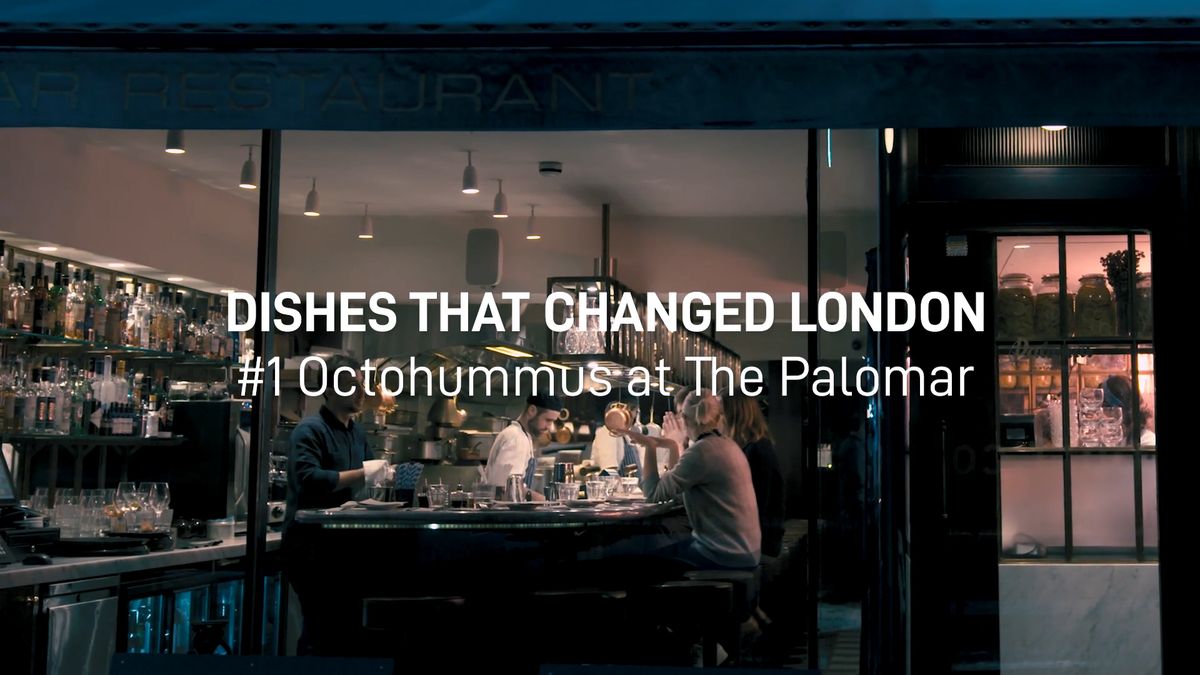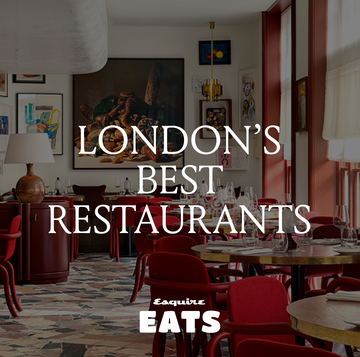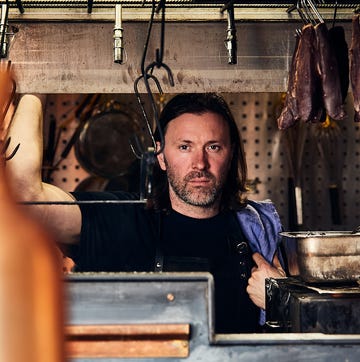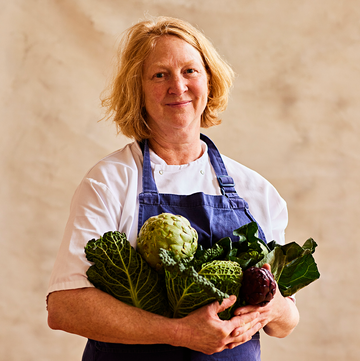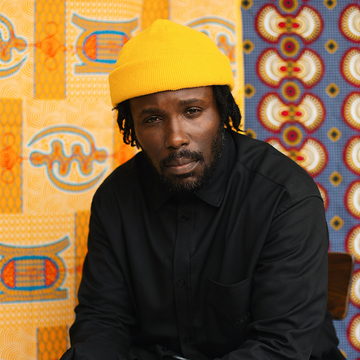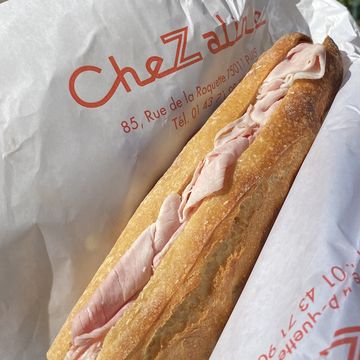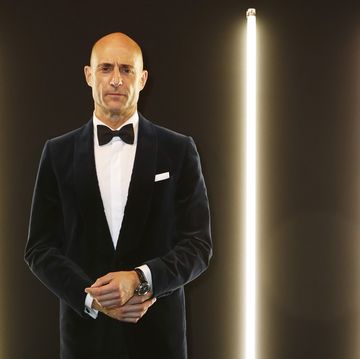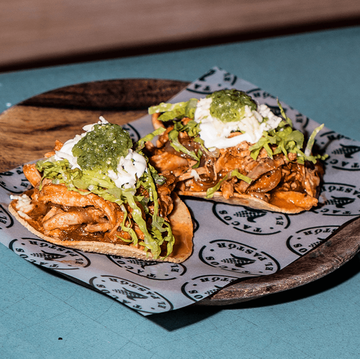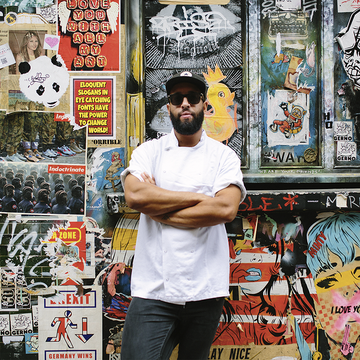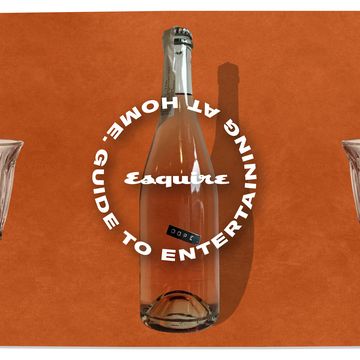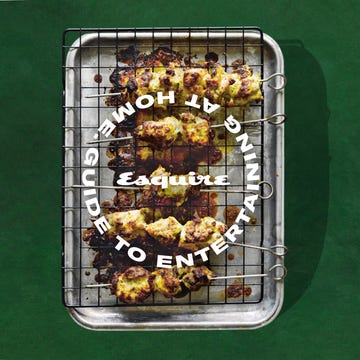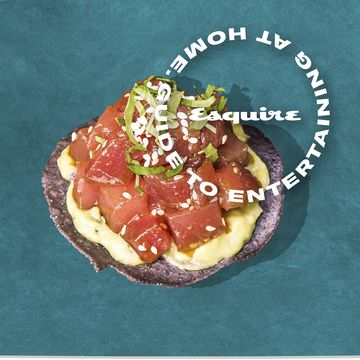It had been snowing all night. The road down the mountain snaked through an icing of whiteness. Daniel Humm, the young chef whose cooking had brought a Michelin star to this patch of the Swiss Alps, had crawled into bed around three in the morning. Now he was up again, two or three hours later, his bones aching and his eyes bloodshot.
Humm had to make it from his kitchen at Gasthaus zum Gupf in Rehetobel, Switzerland, to the market in Zurich, about 90 minutes away. He needed to buy the best lettuces and herbs from the countryside, the best lemons and oranges trucked in from Italy. His dishes relied on these ingredients, and his dishes were so good, so revelatory, that wealthy customers had started flying to the restaurant via helicopter to eat them. He made this trip to the farmers' market three times a week. He'd grown up doing the same thing with his mother, arriving at the market at dawn so that she could score the freshest treasures from the Swiss landscape.
Being a great chef depends on cooking well, sure, but a lot of it comes down to shopping well. Having been raised to revere ingredients, Humm couldn't imagine sleeping in and settling for less. So he put on his boots, stepped into the cold, and got behind the steering wheel of a Mercedes-Benz SUV that belonged to his boss at the restaurant. Even in his exhaustion, Humm recognised the moment he lost control of the Mercedes-Benz. "I realised I was going way too fast into this curve," he remembers. He also realised, as the vehicle slid downward through the ice and snow, that he was heading straight for a steep alpine drop. He was about to go over a cliff. He spotted a single tree that looked like a cinnamon stick rising from a bowl of cream.
"I was steering toward that tree, trying to hit it," he says. The tree in the snow stopped his slide toward doom. It also wrecked the SUV. "The car was totally fucked," Humm says. At that moment, though, the state of his employer's car was not his primary concern. "All I thought about was, 'How am I gonna get to the market?' The restaurant would not function if I didn't have the ingredients."
After extracting himself from the shattered hull of the vehicle, Humm hiked back up the slope to Gasthaus zum Gupf, borrowed another car from a friend, and hauled ass to Zurich to make it to the market in time. "Only on the way back did things start to settle in," he says. "I realised that I could have died."
"Dude, It's Been Hard." Humm says this seconds after he tells me the story about the sliding Mercedes-Benz. It's a Monday evening at I Sodi, a restaurant in New York's West Village where he retreats when he wants what a lot of chefs want on a night off: a bottle or two of good red wine and a few comforting bowls of cheese-dusted pasta, still hot from the boil and just the right amount of chewy. "This is my favourite place in New York," he says. "I come here whenever I can. It's really honest, you know?"
Hard is not necessarily a word that people associate with Daniel Humm. At 40 years old, he is the head chef and one of the owners of Eleven Madison Park, a restaurant in Manhattan that is celebrated around the world for a casual clockwork opulence. Symbolically, Eleven Madison Park also serves as a sort of Buckingham Palace: the heart and focal point of an aggressively expanding empire. Humm and his business partner, Will Guidara — the two men work so closely that they're always talked about in tandem, like the Glimmer Twins of gastronomy — oversee a renowned restaurant, the NoMad, in the eponymous Manhattan hotel, and a warren of bars and nooks in the same space. They're planning to open a branch of the NoMad in Los Angeles in the coming year, as well as a new fine-dining sanctuary in a luxury tower at 425 Park Avenue. They also intend to roll out a group of fast-casual spots under the rubric Made Nice.
To observers who murmur enviously about the duo's seemingly effortless march to power, it can all be a bit much to bear — the money, the air-kissy acclaim, the unsinkable Disney smiles. Theirs is the kind of success that makes mortals smirk. "I told him, 'I can't hang out with you anymore, because it makes me feel bad about myself,'" says Christopher Kostow, the chef at the three-Michelin-starred The Restaurant at Meadowood in Napa Valley. Humm hired Kostow back when both worked at Campton Place in San Francisco, although in age they're only a few months apart. "From the very outset, he knew what he wanted to be," Kostow says. "More than anyone I've met in this industry, he had an unmitigated confidence in his ability to be successful."
At Eleven Madison Park, Humm and Guidara are proponents of a vein of white-tablecloth grandeur that supposedly went out of style a long time ago. When people talk about the food there, they talk about a delirium of pleasure, a rush of extravagance that's usually associated with the Old World.
"He's not only cooking for himself," says Bo Bech, an influential chef from Copenhagen who has befriended Humm over the past few years. "He's actually cooking for people. He wants them to be happy. He's not trying to fuck your mouth with things you've never heard of."
Danny Meyer, the man who originally convinced Humm to move to New York City and conjure up dishes that could match the high-ceilinged majesty of the dining room, praises Humm for dodging "a self-satisfying intellectualism that obscures any kind of pleasure". Meyer goes on: "He can actually satisfy my mind and my hedonistic needs at the same time. Very few people can be a virtuoso as well as a pop artist."
Eat at Eleven Madison Park and a bartender will wheel a cocktail cart alongside your table to make you a Manhattan as deftly balanced as Philippe Petit on a tightrope; a snowy globe of celery root will come hot and tender out of an inflated pig's bladder before being bathed in a truffled sauce; a sommelier will open a bottle of wine by firing up a pair of tongs with what looks like a Bunsen burner and then squeezing the hot tongs right below the cork to melt the glass; for dessert, a torrent of blue flame will pour down the white slopes of your Baked Alaska. These acts are performed with an unflappable happiness that can, at times, seem beyond human. To describe the protocol at Eleven Madison Park as "service with a smile" is to force it into the company of the flair-wearing fast-casual behemoths. But "Make It Nice" is more than just a hashtagged corporate slogan for Guidara and Humm — it's a religion. They take niceness to extremes.
A friend of mine once dined at Eleven Madison Park and offhandedly mumbled something about Game of Thrones and mead. Before his meal was over, a cup of mead had been brought to his table. The job of the staff member known as the "Dreamweaver" is to acquire stray threads of conversation from waiting staff and to act on that information (quickly, before you depart with the customary jar of Humm's handmade granola for the morning after) to make a fantasy come to life. You've always wondered what it would be like if you could return to your apartment on the bare back of a snorting snow-white stallion? Be careful what you wish for.
All of this, paired with Humm's relentlessly delicious neoclassical cooking, elevated Eleven Madison Park to the top of the world's most revered restaurants list in early April. Announced every spring, the World's 50 Best Restaurants (like the Oscars and the Grammys) exerts enormous influence, even though there is no shortage of grumbling about the list having bogus origins and dubious value. (When Noma, René Redzepi's pioneering restaurant in Copenhagen, surprised a lot of people by being named the best restaurant in the world in 2010, the impact on global cuisine, and on Redzepi himself, could be compared to that moment in 1992 when Nirvana's Nevermind knocked Michael Jackson's Dangerous off the top of the Billboard album charts — both conveyed a sense that everything had changed overnight.)
Eleven Madison Park has risen high and fast on the World's 50 Best Restaurants list in recent years; in 2016, it landed at number three, two spots beneath chef Massimo Bottura's idiosyncratic Osteria Francescana in Modena, Italy. Many chefs and restaurateurs had said it was only a matter of time before Eleven Madison Park hit number one, and it has been clear for at least half a decade now that Humm and Guidara very much wanted it to happen. Now, Humm gets to savour — at least for a while — the weirdness of being called the greatest chef alive. But compared with magnetic, charismatic raconteurs such as Redzepi and Bottura and David Chang and Eric Ripert and Ferran Adrià, he has always come across as something of a mystery. He doesn't disagree with that assessment.
"Maybe I feel like in all this time, no one really knows who I am," he says. He's not exactly taciturn, but his manner of speaking is measured, careful, slow, stereotypically Swiss. When people in the food world talk about him, they usually talk about the caviar-and-cream luxury of his cooking (his roast chicken at the NoMad, stuffed and speckled with truffles and foie gras, is one of the great New York City indulgences of our time) and the epic ambition of his bromance with Guidara.
Wylie Dufresne, the boldly imaginative chef behind the defunct wd-50 (who has collaborated with the pair by bringing back some of his most famous dishes for customers at the NoMad Bar), points out that in the eyes of many observers, Humm and Guidara are practically inseparable. "It's not like they're stuck with each other," he says. "But the rise of each of them has been linked to the other. That relationship has helped to define a lot of decisions he's made. It's not totally clear where one starts and the other ends."
What fills in the blanks can sound a lot like the stuff of a charmed life: talented kid rises up the ranks back home in Switzerland; moves to San Francisco and gets four stars at Campton Place ("the brightest star to land in Northern California since Thomas Keller opened the French Laundry," wrote Michael Bauer in the San Francisco Chronicle); gets noticed by the likes of Danny Meyer and Daniel Boulud; moves to New York and gets four stars all over again ("Eleven Madison Park, which opened in 1998, now ranks among the most alluring and impressive restaurants in New York," wrote Frank Bruni in The New York Times); and then just basically rides a ski lift all the way to Valhalla. Make it nice, indeed. That's the image of Daniel Humm, but it's only part of the story. The real story is "Dude, it's been hard." Slash through that blank white canvas and you'll find a world of hurt.
As we finish our meal at I Sodi, Humm tells me that he's got a passion for food, a passion for cooking, and I barely pay attention to this, at first, because it seems like a generic thing to say. Then he puts down a glass of wine and explains that when he uses the word passion, he's referring to a German word: leidenschaft. Break down the word and it means something more along the lines of "enjoy suffering."
"That would be my translation," he says. "Passion is not something pleasant. Are you willing to suffer for this? That's when you have passion. Otherwise, it's a hobby. Passion is not a hobby."
By the time of his near-death experience on that hillside in the Swiss Alps, when he was 25, Daniel Humm had already endured a decade or so of serious leidenschaft. He dropped out of school when he was 14 and moved out of his family's house soon after. He never got along with his father. "Emotionally, he just wasn't there," he says. "I never did what he told me. The more he was against it, the more I went the other way. I moved away from home when I was 15. I've never asked for one more thing."
Books such as Anthony Bourdain's Kitchen Confidential, Bill Buford's Heat, Eric Ripert's 32 Yolks, and Gabrielle Hamilton's Blood, Bones & Butter have taught us all about the burns and humiliations that go hand in hand with the romance surrounding the restaurant stove. Many of Humm's scaldings have been of the emotional variety. As a teenager, Humm fell in love with an older woman; she became pregnant when he was 17.
"Looking back, I was a child myself, barely 18, when my daughter Justine was born," he writes in an early draft of Eleven Madison Park: The Next Chapter, a cookbook/memoir that he plans to publish in October. "Her mother, Elaine, was the love of my life. Those early years were a blur — I was working so much, exhausted on my few days off, salvaging what little energy I had to spend time with my baby." He still has vivid memories of a four-day holiday in Brittany in his early twenties during which the trio chilled out in a beach-town rental and feasted on local seafood.
He has even sharper memories of the moment when Elaine told him that the relationship was ending; she was leaving him for another man. If Humm had been too young to start a family, he was too young to lose one. He wouldn't see his daughter again for years. (She is 21 now and the two have become close. He also has two younger daughters from a subsequent relationship, although he is now single.)
"I was destroyed," he says. "Without that experience, I wouldn't be where I am today. It made me selfish. I knew that the only thing that couldn't be taken from me was my career, so I nearly lost myself in it. It was like my therapy. In a way, she gave me a gift. To get to this point, you need to dig deep. Really deep. You need to be willing to give everything. You even need to be selfish at times."
I look to my left and I see Daniel Humm tangled up like a pretzel. It's a Wednesday morning in New York and the chef and I have met at the Iyengar Yoga Institute on West 22nd Street. Humm exercises at the start of every day. It has been that way since he was a kid. "I need it," he says. "Otherwise, I feel completely lost in my day. If I would ever let this go, everything would fall apart. Even if I sleep three hours, I want to do this."
He has a rotating schedule. Some mornings he goes for a run; other days he trains with heavy gloves and punching bags among the fighters at Mendez Boxing, on East 26th Street. In his youth, he trained for years to be a competitive cyclist in Switzerland, and he regularly returns to that time's rhythms for a bike ride up and down the hills along the western bank of the Hudson River. (He's often joined by Aldo Sohm, the Austrian-born wine master at Le Bernardin.) Twice a week he makes time for yoga. His personal instructor, Lisa Rotell, is elfin in stature, especially when standing next to the leaning tower of Humm's 6ft 4in frame, but her muscles suggest that she could probably hoist him on her shoulders.
In some ways, an Iyengar yoga session serves as a useful expression of the pain-and-pleasure dynamic that constitutes Humm's own OS. With Rotell's guidance, we go through a series of stretches, a few of which involve dangling from ropes that are fixed to the wall. At each point that we hover on the edge of agony, she pushes us a few centimetres farther. Each instance of pain seems to produce a concomitant sensation of euphoria — both of us leave the room feeling high. But if you get an endorphin rush in proportion to the pain produced by each pose, Humm's has to be more intense than mine. The guy has an intimate bond with pain.
"I'm very comfortable with pain," he says. "My cycling career has taught me that. It's all about pain. It's about endurance. Whoever can push themselves harder is going to go farther."
He recently pushed himself to do handstands — no mean feat for a man of his height — and when we get to the end of the Wednesday session, I find myself conked out next to him on the floor as he twists himself, with Rotell's help, into a move that seems more suited to a contortionist than a top chef who needs to let off some steam. This is the moment in a yoga practice when most of us revert to shavasana, or the corpse pose, which might also be described as "lying on the mat and chilling out and maybe even falling asleep to that Jeff Buckley version of 'Hallelujah'."
Humm, instead, opts for halasana, or the plough pose, in which he lies flat on his back but lifts his legs up and then over his face so that his toes are somewhere in the vicinity of the crown of his head and his legs hover parallel to the floor. He does this with an extra wrinkle — incorporating a folding chair. His torso lies beneath the bottom of the chair but his legs squeeze through the place in the chair where the small of your back would normally go. When he has bent his sizable body into this position, Rotell places weighted bags on the backs of his thighs. Then he just sits there for a while. All of this helps "rejuvenate the body and mind like you're taking a nap, which is why he likes it so much," Rotell later tells me. What looks painful is in fact a source of pleasure.
By the time he was 21, Humm had become such a skillful bike racer that he got a chance to compete in the Swiss Championship. The competition took place during the warmer months in Lenzerheide, a mountainous resort town. Humm was determined to kill it, and he launched into the race at a much faster speed than he normally would have gone in practice. Looking back, he remembers a very steep downhill stretch, followed by a sharp left. The track was gravelly. The momentum overwhelmed him. He wheeled too far out and got caught in the fence that marked the race course. His bike went airborne and his body catapulted upward. He doesn't remember the rest. Unconscious, he had to be airlifted to hospital. He had broken ribs, punctured lungs, a broken arm. He spent six months in bed.
Around the time of the accident, Humm's passion for cooking was surging, and when he looks back, he sees the crash — like his crushing breakup with Elaine — as something of a twisted gift. Had neither happened, he may never have pushed himself as hard as he did in the kitchen. Lying in the hospital bed, he realised that he was squandering his time and leidenschaft on bike racing. "I was good, but I was never going to be Lance Armstrong," he says. "I decided to put all my energy into cooking. I made cooking my sport."
If anything was ultimately bound to nudge Daniel Humm into that top spot on the World's 50 Best Restaurants list, it was his sheer athleticism. Plenty of chefs work hard. He's willing to work harder. From the outside, Humm's accomplishments at Eleven Madison Park may seem to have been written in the stars, but the reality is that his early years in the kitchen were nightmarishly touch and go.
The chef arrived in New York in 2006, lured by Meyer, who would later sell Eleven Madison Park to Guidara and Humm. At the time, the restaurant had two stars from The New York Times, which revered restaurant critic Frank Bruni would soon increase to three, but three stars wouldn't be enough to help many high-end chefs survive the great recession. By 2008, the New York restaurant scene reflected a disaster movie, with massive investments evaporating in sulphurous puffs of smoke everywhere.
"Dude, we had nights when we did 10 covers," Humm recalls. "We thought, 'Maybe this is not the time when the world wants a restaurant like this.' We lost money. We weren't sure we were gonna make it, honestly. And then Frank Bruni came in. We were like, 'He didn't come here to give us another three stars.' He came four or five times. He put us through the wringer."
They cut costs. They waited. They sweated it out. They listened to the clinking of silverware in a half-empty dining room. Bruni bestowed four stars on Eleven Madison Park in August 2009. "We've never had an empty seat since that day," Humm says. "Unbelievable. It was a very emotional moment for us." By then, though, there had been casualties.
Humm may have a high threshold for pain, but not everyone shared his willingness to suffer for perfection. His wrath could scorch skulls. He had earned his stripes in European kitchens where chefs made the drill sergeant in Full Metal Jacket look like a softie. "Public humiliation, abuse — this is how we kept order," he says. "This is how we led." Governed by an "uncontrollable passion," Humm in those days reacted to even the tiniest instances of tardiness and carelessness with a pent-up alpine avalanche of rage.
"One night, a young cook did something wrong," he writes in his forthcoming book. "I do not even remember what it was, but I do remember impulsively flinging a quart container of avocado roulade into his face. Will happened to be in the kitchen and see this. After months of allowing me to behave as a terror in the kitchen, he had had enough. He dragged me into our office like a child and proceeded to absolutely demolish me. I was actually scared. He told me that sort of behaviour no longer existed in the restaurant or everything was over."
At Eleven Madison Park last November, I was standing next to Humm, listening to him talk about the evolution of a lobster dish, when we heard, a few yards away, the sleighbellish jingle and crash of a wine glass falling to the floor. A silence came next. You could almost feel jaws and shoulder muscles clenching up all over the kitchen. Humm's mouth kept moving. He tried to continue the conversation, but then he trailed off. Storm clouds passed over mountain peaks in his eyes. Without shifting his gaze, he called out to Dmitri Magi, Eleven Madison Park's chef de cuisine. "Dmitri," he said. "Yesterday something fell. It's gotta stop." Magi acknowledged this. Humm lowered his eyes. "My old me would have gone over there and yelled at everyone," he said.
Lately, Humm has begun to feel as though he has finally found himself as a chef. It's as if he is just starting out. He used to get inspiration from cookbooks, but he has stopped flipping through them. He spends his free time in art galleries and museums. He has become obsessed with minimalism. He keeps going back to the calming, meditative grids of Agnes Martin; he also returns compulsively to Lucio Fontana, who created his signature works by preparing blank canvases and slashing through each one with a knife.
Much of the menu at Eleven Madison Park reflects a similar aesthetic in spite of its opulence. Unlike many of his culinary contemporaries, restlessly fermenting and foraging in a quest for new flavours and ingredients, Humm fixates on the same ones — white ones, pale ones: apples, fennel, lobster, parsnips. He wants to go painstakingly deeper into each ingredient. He wants to come back to it season after season and make it taste even more like itself. In his mind, he keeps going back to that market in Zurich, hunting for the most perfect head of lettuce, the most exquisite fig.
He chronicles every tortuous step in a dish's evolution. There is even an archivist at Eleven Madison Park who takes photographs of each dish as it morphs from week to week; those pictures are organised with monastic devotion in a series of binders. Curious about that pear dessert? You can open one of the binders and watch how the dessert changed, just like watching an embryo in a sonogram. Maybe it goes back to his Swiss roots, or that snowy mountainside that once almost sent him hurtling to his death, but Humm's obsession lately has been whiteness. His most distinctive dishes at Eleven Madison Park have become, like certain passages of Moby-Dick, veritable studies in whiteness.
"The celery root is the most important dish for me," he says. For years he had tried to figure out how to present dishes in a minimalist way, but he couldn't quite pull it off. Then it clicked: the bland, pallid bulb of celery, transformed through classic French technique into a luxurious orb. On the plate it looks like nothing much — coming across almost like a golf ball that has splashed into a muddy puddle — but it tastes like everything.
"I'm not afraid of making everything all one colour," Humm says. "I like extremes. I live in extremes. I always have."
Portrait by Henry Leutwyler


